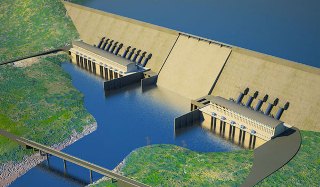Nile dam set to generate power, Ethiopia to consult Egypt, Sudan ahead
By Tesfa-Alem Tekle
January 20, 2016 (ADDIS ABABA) – An Ethiopian official said Wednesday that the Grand Renaissance Dam (GERD) which the horn of Africa’s nation is constructing along the Nile River is due to begin generating power very soon.

According to the official, the initial electricity generation will start soon the two turbines which recently arrived at the dam site and will get installed in the coming weeks. Ethiopia has ordered a total of 16 turbines from companies oversees which will enable the massive power plant project to generate 6,000 megawatts of electricity upon completion.
Concerns are expected to rise from the Egyptian side when the Nile dam begins generating power.
While Sudan is seen as a beneficiary from the new dam which is at 20km from the border, Egypt fears that water in the dam’s large reservoir will be used for irrigation, diminishing downstream supply. But, Ethiopia insists that the main purpose of this project is to produce power and water will continue to reach Egypt like before.
Speaking to Sudan Tribune, Girma Fikru, a water resources engineer in Addis Ababa said Ethiopia’s plan to start generating electricity from the power plant while tripartite negotiations are yet in progress might not be a smarter move.
“Ethiopia’s move to start generating power in the middle of the ongoing tripartite meetings on GERD could risk collapse of the negotiations and might trigger a renewed dispute over the Nile water resources,” said Fikru.
He said Ethiopia should first finalize a trust building activities with lower riparian countries most importantly with Egypt before starting the dam to generate power.
The Ethiopian official however added Addis Ababa will be engaged in consultations with lower riparian countries (Egypt and Sudan) to decide on the amount of water the Dam reservoir should be holding before it launches its first phase power generation.
The $4.2 billion huge project being constructed by the government and people of Ethiopia has so far consumed about $2.2 billion.
Debretsion Gebremichael, Deputy Prime Minister for Finance and Economic Cluster and Minister of Communication and Information Technology said the government has no financial constraints and construction of the dam will be completed as per schedule.
Some 4 million cubic meter concrete has so far been poured to the 1,780m long and 145m high dam.
During their tripartite meeting last month, Ethiopia Sudan and Egypt agreed in Khartoum to speed up the impact assessment study of the controversial dam project which lower riparian countries particularly Egypt fears would ultimately curtail its historical water share.
During the meeting, Cairo had asked for an increase to bottom water outlets at the dam from two to four to prevent significant reduce on water flow to its territory. Ethiopia however refused Cairo’s request arguing that enough impact studies had already been made and no redesigning was necessary.
The three parties have selected two foreign consultancy firms, the French Artelia and BRL groups to undertake impact studies on the Dam particularly if there are risks that could bring significant harm on Sudan and Egypt.
The construction of what would be Africa’s largest and amongst the world’s top ten leading power plants has been a source of dispute with Egypt which over 80 % of people depend on for water supply.
Egypt has been taking the project as a threat to its national water security and has previously considered other options including military action to halt the dam project.
However Egypt seems to have changed its position lately following relentless efforts to build mutual trust with the North African country regarding the grand dam project.
Egypt’s irrigation minister, Hossam Moghazi, on Wednesday said that although Cairo is concerned about the Ethiopia’s giant dam project, the country however doesn’t view it as a “threat”.
Moghazi confirmed that Egypt is not against the development of the Nile Basin countries in deviating from 1929 and 1959 treaties which had granted the North African nation the right to veto any projects upstream.
Ethiopia said the project which is being constructed some 25km away from the Sudanese border is never intended to harm Egyptians but is necessary for development and should be taken as a symbol of cooperation among Egypt, Sudan and Ethiopia.
Ethiopian officials stress that the main goal of the dam is “combating poverty and realizing development and prosperity”
The construction of the ambitious hydroelectric power project on the African continent has reached at nearly halfway mark and is slated for completion in 2017.
(ST)
